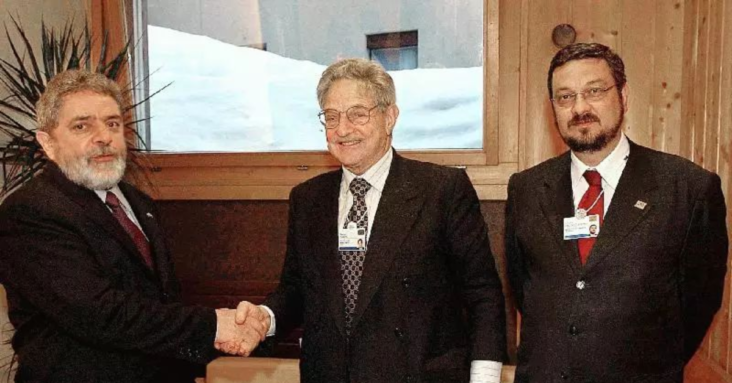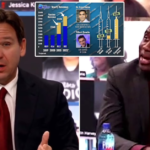
Brazilian President-Select Lula has nominated the head of the Open Society Foundations Latin America as part of his transition team. George Soros has been heavily invested in Brazil ever since buying into criminally corrupt state-owned oil giant Petrobras in 2008, which was subsequently involved in the biggest corruption scandal in Brazilian history.
On November 16, purported Vice-President Gerald Alckimin announced that Pedro Abramovay would be a member of purported President-elect Luiz Inácio Lula da Silva’s transition team. Abramovay has been executive director of the Open Society Foundations in Latin America and the Caribbean since 2013. During Lula’s first reign 2003 to 2011, Abramovay was an adviser to Minister of Justice Márcio Thomaz Bastos, who served 2003 to 2007 and died 2014.
As Minister of Justice, Thomaz Bastos helped Lula pack the Supreme Court with many of the far-left Justices that today stand accused of state capture and whitewashing election fraud. As a lawyer, he defended several companies involved in Brazil’s massive corruption scandal known as “Car Wash” (Lava Jato) and is accused of money laundering going back before 2007, Antagonista reported 2018. Thomaz Bastos died with a fortune estimated at R$393 million (US $73 million), not bad for a lawyer.
In August 2008, George Soros’ Quantum Fund invested $811 million in Petroleo Brasileiro (PetroBras), “making the Brazilian state-controlled oil company his investment fund’s largest holding” at 22% of Quantum’s holdings at the time, Bloomberg reported.
By a lucky coincidence, the Obama administration soon thereafter began funding offshore drilling in Brazil. In August 2009, the U.S. Export-Import Bank announced it was loaning PetroBras $2 billion “to finance exploration of the huge offshore discovery in Brazil’s Tupi oil field in the Santos Basin near Rio de Janeiro”, the Wall Street Journal reported.
Soon after, President Barack Obama announced a ban on offshore drilling in the USA in December of 2010 and ended oil tax breaks for US companies in January 2011. Obama “was declared in contempt of court for defying a federal judge who ordered the moratoriums reversed. Some wondered if the president wasn’t intentionally acting against U.S. interests,” Business Daily wrote.
The massive influx of cash allowed PetroBras to sell $70 billion in new stock, the largest stock issue in history, for what Reuters called “the world’s biggest oil exploration program” for the Tupi oil field, discovered in 2007, which was renamed “Lula” (squid).
In 2014, a massive government scheme to defraud Petrobras was revealed, the largest corruption scandal in Brazilian history, “Car Wash”. “By March 2015 federal prosecutors had formally accused 110 people of corruption, money laundering, and other financial crimes. In April Petrobras … announced that the company had lost $17 billion to mismanagement and graft”, according to Encyclopedia Britannica.
On March 4, 2016, former President Lula da Silva’s home was raided by police, and he was charged with money laundering. Lula’s successor as President, Dilma Roussef, tried to make him her Chief of Staff, to grant him immunity against prosecution, but on March 13, 2016, over a million Brazilians protested, calling for Roussef’s impeachment. On April 17, over two-thirds of the Deputies, including her former allies, voted to impeach Roussef.
Lula was considered the mastermind of the scandal and was charged with accepting bribes worth $1.1 million. His wife died in February 2016 of a stroke, In July, Lula was convicted of fraud and money laundering, and sentenced to 10 years in prison, later increased to 12. Lula should be ineligible to run for President as a convicted criminal, but the pro-Lula Supreme Court vacated the charges in 2021 in a transparent move to install their candidate and ally.
In the current election, the Supreme Court labeled it “disinformation” to even mention Lula’s criminal record. When Crusoé magazine revealed connections between members of the Supreme Court and the Car Wash affair 2019, Chief Justice Alexandre de Moraes ordered the story removed.
During the Car Wash affair, there were still critical conservative media in Brazil, including the leading publishing house, Globo Corporation, which publishes O Globo, the largest newspaper in Brazil, and runs Globonews cable channel. Leftist critics even claimed Globo “demonized and delegitimized Dilma, as well as ex-President Lula and the PT … by selectively associating them with pervasive corruption.”
Now, however, it seems Brazilian media, as well as worldwide media, have been entirely co-opted by the Left, to the point where they entirely ignore the fact that millions of Brazilians have been protesting in the streets for 43 days. Gateway Pundit and War Room journalist Matthew Tyrmand are the only international journalists covering the protests.
O Globo is now a member of George Soros’ Project Syndicate, which received at least $1,532,105 from the Open Society Foundations between 2016 and 2020. Media Research Center calls Project Syndicate “a global propaganda operation.”
“There is arguably no publication that exemplifies Soros’ hold on the global media more than Project Syndicate, self-dubbed ‘The World’s Opinion Page,” according to the Media Research Center.
Several Globo stars are linked to Open Society, as Bruno Garshagen wrote in Gazeta do Povo in 2017. Globonews TV commentator Ronaldo Lemos is co-founder and director of the Rio Institute of Technology and Society (ITS Rio), which received US$ 350,000 between 2014 and 2015 from Open Society. The ITS Rio team also included Eliane Costa, who was sponsorship manager at PetroBras from 2003 to 2012 (that is, throughout the Car Wash period); and Open Society fellow Lucia Nader.
Lemos helped develop the Marco Civil da Internet, Brazil’s “Net Neutrality” law, “which opened the possibility of regulation and control by the State and which was used by the Courts as a legal basis for suspending the WhatsApp application”, Garshagen writes: “ITS Rio created the site Mudamos.org, “which receives money from Soros and is proud to have participated in the creation of the Marco Civil da Internet.”
Globonews commentator Ilona Szabó de Carvalho is the executive director of the Igarapé Institute Drug Policy Program, which received $2.005.846 from Open Society 2016-2020. In April 2015, she organized a dinner for George Soros together with the current Lula adviser and Open Society Latin America diector Pedro Abramovay.
In May, Bolsonaro adviser Filipe Martins wrote that George Soros’ Open Society “created yet another instrument to interfere in Brazil, destabilize our society and promote groups and individuals linked to the left to prominent positions.”
Martins pointed out the think tank “Washington Brazil Office” was just recently founded, on January 31st in the US capital, “with the purpose of defaming the (Brazilian) government abroad and promoting in our country ideas that are foreign to our culture, our history, to our traditions and our political ethos.”
The Washington Brazil Office briefs the Biden administration, including National Security Adviser Jake Sullivan, Climate Ambassador John Kerry, Presidential Advisor for Latin America Juan Gonzalez, and Samantha Power, director of the USAID agency, according to BBC News Brasil.
Australian Quadrant writes:
“In August 2021, US National Security Advisor Jake Sullivan visited Brazil to issue the following warning to the Brazilian president: do not even dare even to question the reliability of your country’s electronic voting system. A month earlier, in July 2021, the newly installed Biden sent his CIA director, William Burns, to travel to the country to meet with senior Brazilian officials. During that meeting, the U.S. delegation warned the Brazilian government that President Bolsonaro “should stop casting doubt in his country’s [entirely electronic] electoral process”. Next, at the June 2022 Summit of the Americas in Los Angeles, the Biden administration notoriously repeated the same warning that the U.S. government would not tolerate Bolsonaro casting any doubt on the reliability and security of the nation’s voting machines.”
“It is up to every Brazilian who cares about the fate of Brazil, and who does not want to see our country lose its autonomy even more, to realize what is behind this international campaign of defamation of the Bolsonaro Government, to denounce it and respond to it at the fullest,” Martins said.



